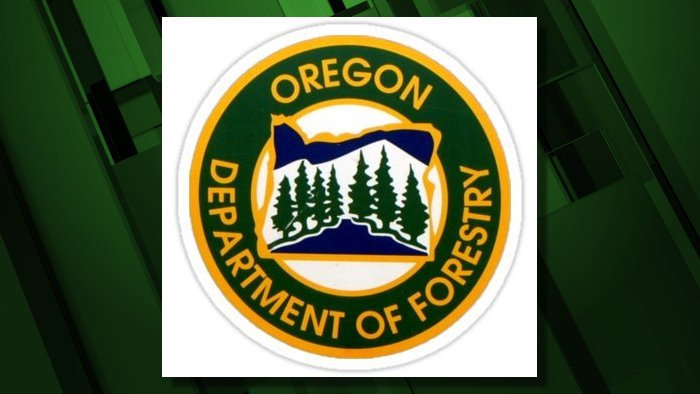After thousands of lightning strikes across the state, Oregon Dept. of Forestry reminds all to be informed and prepared

SALEM, Ore. (KTVZ) – Between Wednesday and Sunday, Oregon experienced two separate lightning events that resulted in over 2,000 strikes across the state, which primarily affected Southern, Central and Eastern Oregon.
With multiple crews engaged in initial attack on new fire starts and all of Oregon’s available incident management teams on assignment, now is the time for Oregonians to be prepared for wildfires and help prevent future ignitions.
Oregonians are urged to actively practice wildfire prevention, prepare their home and a go-bag for evacuation and know where to sign up for alerts.
How can people help prevent wildfires?
The Oregon Department of Forestry is urging the public to actively practice wildfire prevention as the state works to control over 20 large fires. Additional human-caused fires on the landscape will draw the firefighting efforts away from the lightning-caused fires and put extra strain on ground and aviation resources, which are already spread thin. YOU can help prevent wildfires by:
- Checking and following your local fire regulations. The majority of the state is either in high or extreme fire danger right now, meaning even the smallest of sparks could start the next large wildfire.
- Remember that debris burning is prohibited statewide.
- Return to check on your burn site if you burned earlier in the year.
- Make sure your car has been recently serviced to avoid faulty parts throwing sparks.
- Don't drag tow chains.
- Avoid parking vehicles on tall, dry grass.
- Recreate responsibly. Where campfires are allowed, make sure your campfire is DEAD OUT before leaving it by drowning it with water, stirring it with a shovel and repeating that process until it is cold to the touch. If there is heat coming off it, there are still embers that could reignite.
How can I prepare my home to be resilient against fire?
The Oregon State Fire Marshal can help you create defensible space. Defensible space is the area around your home and property that’s maintained to prevent wildfire from spreading. Creating and maintaining defensible space is the best protection you can give your home against wildfire.
A few ideas to protect the first five feet around your home:
- Remove leaves, pine needles, and other debris from the roof, gutters, and on top of and underneath decks.
- Trim tall plants and bushes growing directly under eaves and make sure trees and plants have adequate space from your home and other vegetation.
- Remove dead and combustible plants and mulch; replace it with decorative rock or gravel.
- Cover exterior attic vents, soffit vents, and areas below decks and patios with 1/8" metal wire mesh.
Be cautious with using power tools and other equipment that can throw sparks and don’t operate machinery in the heat of the day. Summer is a great time to plan defensible space projects to start working on in the fall when wildfire season is over.
How can I prepare myself in case I need to evacuate?
The Oregon Department of Emergency Management (OEM) urges everyone to prepare for wildfires and other emergencies by knowing evacuation levels, staying informed, having a plan, and having a go-kit ready.
Evacuation Levels
- Oregon follows a three-level evacuation notification system, each structured around safety threat level.
- Oregonians should become familiar with "Be Ready, Be Set, Go!" evacuation levels to make informed decisions when receiving evacuation notices.
- OEM urges people to evacuate whenever they feel unsafe, conditions can change rapidly; individuals should always make the best decision for their safety.
- Following an evacuation, people should not return to the area until public safety officials state it is safe.
Stay Informed
- Stay informed sign up to receive evacuation at, ORAlert.gov remember to update information if need be.
- Find the websites for your county emergency management, sheriff's office, or tribal police and follow them on social media.
- Check your phone settingsto ensure wireless emergency alerts are turned on.
Have a Plan
- Do you know what to do during an evacuation? This evacuation checklist explains what to do before, during, and after an evacuation.
- Establish a communication plan with a list of important contacts and a safe place for loved ones to meet if they are separated during an emergency.
- Identify multiple evacuation routes from home, work, or school and plan for transportation needs.
- People with disabilities should consider individual circumstances and specific needs when planning for evacuation, such as special equipment, transportation, and service animals.
- Have an evacuation plan for pets, make a pet evacuation kit in a tote bag or pet crate, and plan for transportation and sheltering of large animals such as horses and other livestock.
Make a Go-Kit
- Assemble an emergency kit of essential supplies that can be grabbed quickly.
- Pack an easy-to-carry backpack or bag for each household member with health and safety items such as food, water, medication, flashlights, phone chargers, clothing, and important documents. Visit American Red Cross to learn more.
Find more information and resources at Wildfire.Oregon.gov.
Recreate Responsibly
Oregon Parks and Recreation Department (OPRD) encourages visitors to know before they go when it comes to campfire restrictions. Due to the continued low humidity and risk of wildfires, OPRD banned campfires at all Oregon State Parks east of the Cascades as well as at parks in high-risk areas around the state until conditions improve. Most Oregon State Parks currently have a campfire ban. Please check park webpages or the wildfire feature story at stateparks.oregon.gov/ before your next visit. Thank you for helping to reduce the risk of wildfires.